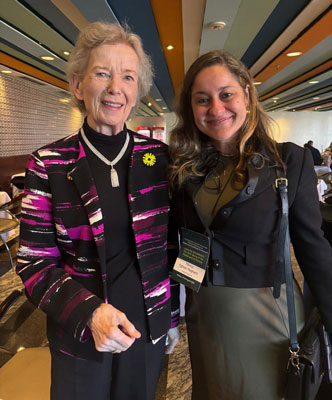 .
. 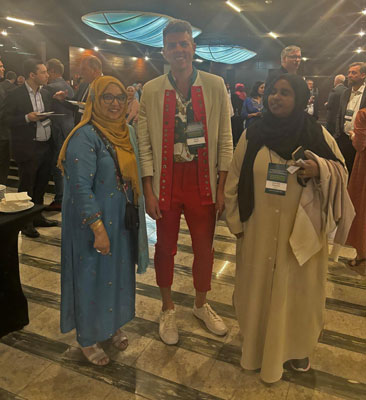
Mary Robinson with Monica Maghami; WG members Husna Ahmad and Carrick Reddin
G20 Interfaith Forum
Brasilia, 19-22 August 2024
I went to Brasilia, the capital of Brazil, on 18-23 August 2024 to participate in the G20 Interfaith Forum (IF20) and PaRD (International Partnership on Religion and Sustainable Development) Annual Forum on Religion and Sustainable Development on the theme Leave No One Behind: The Well-Being of the Planet and Its People. I chair the IF20 Working Group on Religion and Environment and helped to prepare the Forum, to provide an interfaith input to the G20 meeting in Brazil in December 2024. Several members of the working group attended, including another International Environment Forum member, Monica Maghami, Brazilian now living in London.
The opening Plenary Towards an Equitable World of Promise and Opportunity featured Mary Robinson, Chair of the Elders and former President of Ireland, as keynote speaker. Another plenary on Holistic well-being in a World in Turmoil: Moving from a linear to cyclic worldview and developing alternative paradigms to measure development and prosperity featured indigenous and spiritual holistic world views. There was a plenary on Challenges of Sustainability and Peace: For People and Planet. A plenary on Leaving no one Behind: Care for the most vulnerable was moderated by Bani Dugal of the Bahá’í International Community (BIC).
 .
. 
Mary Robinson with Monica Maghami; WG members Husna Ahmad and
Carrick Reddin
Much of the forum was in concurrent sessions, on subjects such as religious freedom, food security, sacred sites, religious literacy, child dignity, poverty and inequality, displaced populations, climate finance, religious action on corruption, confronting racism, hate crimes and radicalization, Indigenous and community peace building, environmental defense, the Interfaith Rainforest Initiative, human trafficking, protection of refugees, the future of work, global taxation reform, and AI in a faith context.
A session on disinformation and incitement to violence featured Nazila Ghanea, UN Special Rapporteur on Freedom of Religion or Belief. Bani Dugal, Principal Representative to the United Nations, Baha’í International Community, spoke in a session on Women building peace and resilient communities. IEF member Monica Maghami, launched the discussion in a session on Women and the Environment.
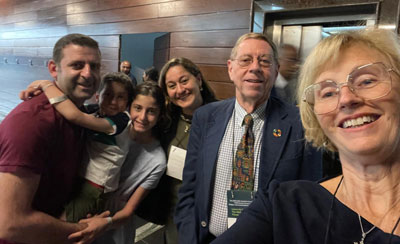
Monica Maghami and family with me and Sherrie Steiner of IF20
working group
I spoke in a session on Lessons from Religious advocacy on environment: Laudato Si, Al Mizan. In my presentation, I showed that religious advocacy on environment has a long history, including in the Bahá’í community. Already in 1912, ‘Abdu’l-Bahá warned of human activities upsetting the balance of nature in a lecture at Stanford University. In the 1930s-1950s the Bahá’í leadership supported reforestation in Palestine, Africa and elsewhere. Starting with the Bahá’í International Community representation at the 1972 UN Conference on the Human Environment in Stockholm, where I participated, the BIC has presented over 50 statements on environment and sustainability at UN conferences and other events. In 1995, the Alliance of Religions and Conservation (ARC) hosted a Summit at Windsor Castle with religious leaders including the Ecumenical Patriarch, the Archbishop of Canterbury, Ruhiyyih Khanum the leading Bahá’í dignitary and many others, where all agreed that their teachings on nature and the environment were in harmony. I presented issues to the meeting on behalf of the UN. In 2009, ARC and UNDP invited all the faiths to present action plans on climate change to UN Secretary-General Ban Ki Moon and Prince Philip at Windsor Castle, where I was part of the BIC delegation. I told the Forum about our Bahá’í-inspired professional scientific organization, the International Environment Forum, with members in over 90 countries, that maintains a website with relevant resources from many faith traditions, issues a monthly newsletter, and holds annual conferences, the next in association with the UN Summit of the Future in September 2024. The IEF published a summary and commentary on Laudado Si in 2015 https://iefworld.org/node/853 and of Al-Mizan in 2024 https://iefworld.org/Al-Mizan. With the accelerating climate crisis and widespread failures in implementation of global agreements, there is now a need to bring interfaith collaboration into the discussions on the fundamental transformation needed away from the materialistic consumer society and an economy concerned only with profit. With the IEF, I am working with Mobilizing an Earth Governance Alliance (MEGA), the Climate Governance Commission, the Global Governance Forum, and many other partners, to introduce a spiritual dimension to motivate change. The G20 Interfaith Forum and its Religion and Environment Working Group have supported interfaith collaboration on climate change and the environment in the G20 process and with webinars, including Indigenous spiritualities.
The video recording of this session is now available at: https://www.youtube.com/watch?v=a54vheAEjuA&list=PLwjUtDUK8apf_lCY_8S2IWNRDjAqFHI-t&index=8.
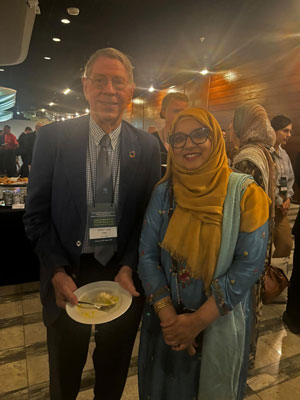 .
. 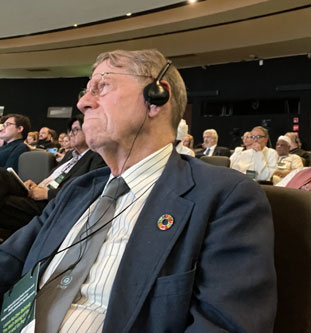
Me with Husna Ahmad; listening to a session
A supporting IF20 Policy Brief on Faith Action in Response to Climate Change which I drafted was posted in July on the IF20 website.
It discusses the challenges, describes the global response thus far,
emphasizes the justice dimension, shows the need for the reform of global
governance, outlines religious responses, and makes recommendations:
1) religious institutions should set an example;
(2) there are opportunities for interfaith collaboration in information
campaigns on climate awareness, collaborative projects, and the
complementarity of science and religion;
(3) faith communities should cooperate with other organizations;
(4) holding governments and decision-makers accountable;
(5) be a powerful voice in supporting the transformation of businesses and
the corporate sector towards social, environmental, and financial
responsibility;
(6) work for community transformation at the local level to
climate-friendly alternatives and more moderate lifestyles;
(7) emphasise the important roles that women play in climate action; and
(8) build awareness of the climate challenge among children and youth,
overcoming climate anxiety and undertaking practical actions.
In the closing discussion, Bani Dugal of BIC was one of the panelists. Representatives of the Brazilian Bahá’í office of external affairs were also present at the Forum.
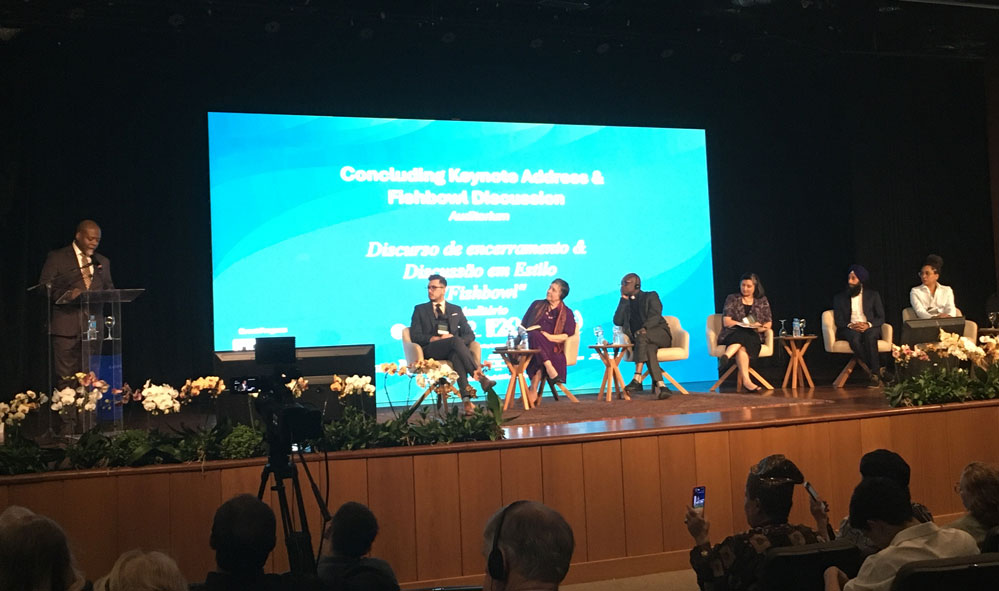
Closing discussion with Bani Dugal (third from right)
A main purpose of the Forum was to launch recommendations for the G20 meeting taking place in Brazil in December. Here is the appeal and its recommendations.
June 2024
The world’s religious communities, serving a large majority of the world’s population, contribute to the public good every day. They provide essential services in health and education, support the destitute, work to prevent conflicts and build peace, and offer hope and meaning to countless lives. Their insight, experience, and commitment to human rights and dignity can benefit policy processes at every level of governance, including the topics Brazil has identified as G20 priorities. Engaging with religious communities can improve policy development and enhance popular engagement with policy implementation.
• Brazil, long a witness to creative religious collaboration, is well positioned to incorporate this insight — that policy engagement with faith communities should be a priority — into the G20 process.
The central common focus of religious communities worldwide is action and advocacy for and with the most vulnerable, including those forcibly displaced and children. Actions include charitable support, compassionate service, and programs that enhance human and community capabilities — Brazil’s Pastoral da Criança is a prime example. Visions that can help bridge the divides that trouble the world underlie many religious approaches to human welfare and relationships with nature. In 2024, the G20 Interfaith Forum urges priority action on five areas:
• Food crises. Religious actors offer untapped potential to strengthen global, national, and local efforts to fight hunger and malnutrition. Assets include teaching and practical actions that address and link urgent hunger needs and their root causes. Faith actors can, for example, be leaders in reducing food waste, investing in local, smallholder farming practices, and supporting nutritional health.
• Environment. Finding workable and adequate solutions to climate and other environmental concerns are G20 priorities. The moral and practical voices of religious communities can help bring rainforest protection (vital to natural carbon sequestration) to scale, working with indigenous communities who live there. The Interfaith Rainforest Initiative exemplifies such approaches. Engagement with religious constituencies can also enhance public support for a fair and inclusive energy transition.
• Peacebuilding. Failures of trust across institutions and rising hate speech and incitement to violence call for urgent leadership responses. Programs and models like Indonesia’s Cross Cultural Religious Literacy Program and Arigatou International’s Ethics Education demonstrate how education reforms that include strategic religious engagement can help foster social harmony. Strong international leadership support is needed to help G20 members expand and learn from such promising programs. Strategies for dealing with Artificial Intelligence should include engagement of religious actors.
• Debt relief. The year 2000 Jubilee Movement calling for urgent action to address debt burdens of poorer countries harnessed the powerful ethical voice of religious communities united around this common cause. As we approach the 2025 Jubilee year and seek to address unsustainable debt burdens and rising demands for reforms of global governance, active and continuing involvement of religious communities in dialogue is essential.
• Human trafficking and modern slavery. Specific commitments by G20 leaders, supported by the G20 Interfaith Forum, to step up funding against human trafficking (labor, sex trafficking, organ trafficking and other forms) and modern slavery by 2030 would signal renewed commitment to truly “leave no one behind”. The G20 Interfaith Forum proposes to organize and lead a G20 Working Group in support of such a commitment.
The United Nations and G20 calls to “leave no one behind” and achieve the sustainable development goals are seen by too many as empty slogans. The G20 Communique should therefore include specific actions and commitments to priority humanitarian needs (especially for those forcibly displaced) and to address poverty. The G20 Interfaith Forum is committed to fostering continuing and active engagement between policymakers and the G20 interfaith community to assure that those who are excluded and left behind are lifted up with care and compassion.
Policy Briefs with expanded analysis and action recommendations related to these five focus areas and other important tissues are available at https://www.g20interfaith.org/if20-policy-briefs/, along with the supporting policy brief on Faith Action in Response to Climate Change.
Return to travel 2024 page - Return to personal home page
Last updated 31 August 2024
Photographs copyright © Arthur Lyon Dahl 2024